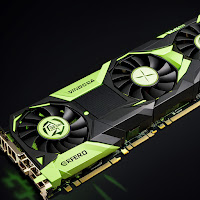AI news: Nvidia's Crucial Role in A.I. Sparks Calls for U.S. Regulation
The landscape of artificial intelligence (A.I.) regulation is a complex terrain, and one of the leading figures in the A.I. world has a bold suggestion: utilize Nvidia, a critical player in the field, to help shape global A.I. regulations. Mustafa Suleyman, co-founder of DeepMind and Inflection AI, sees Nvidia's technology as a practical chokepoint that the United States can leverage to influence the direction of A.I. regulation worldwide.
Nvidia is no stranger to the A.I. arena. Its processors play a pivotal role in training large language models, which power A.I. applications like OpenAI's ChatGPT and Google's Bard. This puts Nvidia in a unique position, making its products an essential element of the A.I. ecosystem.
Suleyman believes that this position of influence could be harnessed by the United States to exert its control over the development and regulation of A.I. Speaking to the Financial Times, Suleyman stated, "Nvidia's processors are an incredibly practical chokepoint that would allow the U.S. to impose itself on all other actors" in the A.I. landscape.
In July, Inflection AI, co-founded by Suleyman, joined forces with several tech giants, including Google, Microsoft, Meta, and OpenAI, to commit to managing A.I. risks. These commitments encompass rigorous testing of A.I. models before public release, investments in cybersecurity, and the development of mechanisms to identify A.I.-generated content.
Suleyman advocates that the United States should mandate that any entity using Nvidia chips adheres to, at a minimum, the voluntary commitments made at the White House regarding A.I. Suleyman's vision reflects a desire to assert American leadership in the global A.I. regulatory landscape.
The European Union, for instance, is currently considering the A.I. Act, which evaluates the risk levels associated with various A.I. applications. High-risk A.I. programs, those capable of causing harm, are subject to extensive testing before they can be released. Some A.I. uses, like facial recognition, might face outright bans.
While Europe's proactive approach to A.I. regulation is commendable, it has raised concerns among business leaders who fear that overregulation could hamper innovation and competitiveness.
On the other hand, China has also been proactive in setting A.I. rules. Regulators in China imposed restrictions on deepfake technology and issued regulations on generative A.I. last year. While these rules aim to balance innovation with responsible use, they have been seen as less restrictive and more conducive to innovation, according to industry leaders like Baidu CEO Robin Li.
This light-touch approach in China has led to rapid advancements in A.I., with companies like Baidu gaining approval to release their chatbots to the public. The fear of stifling innovation has been a significant argument against stringent A.I. regulation in the United States.
The United States' interest in controlling A.I. technologies is also intertwined with economic and geopolitical considerations. Nvidia's chips are pivotal for A.I. development, contributing significantly to the company's data center revenue. In fact, Nvidia derives up to 25% of its data center revenue from China, making it a vital player in the A.I. landscape.
The U.S. government, led by the Biden administration, has implemented measures to restrict the sale of advanced chips to Chinese companies working on strategic technologies, including A.I. Such actions reflect an effort to limit China's progress in A.I., particularly in areas related to national security.
While Nvidia doesn't foresee an immediate impact from export controls, there are concerns about long-term consequences, including a potential permanent loss of opportunities for the United States.
As the U.S. government navigates the complexities of A.I. regulation, the world watches closely. The future of A.I. development and deployment will likely be shaped by the delicate balance between fostering innovation, addressing risks, and geopolitical considerations. Whether Nvidia's chips become a tool for global A.I. regulation remains to be seen, but they undoubtedly play a crucial role in the evolving A.I. landscape.

